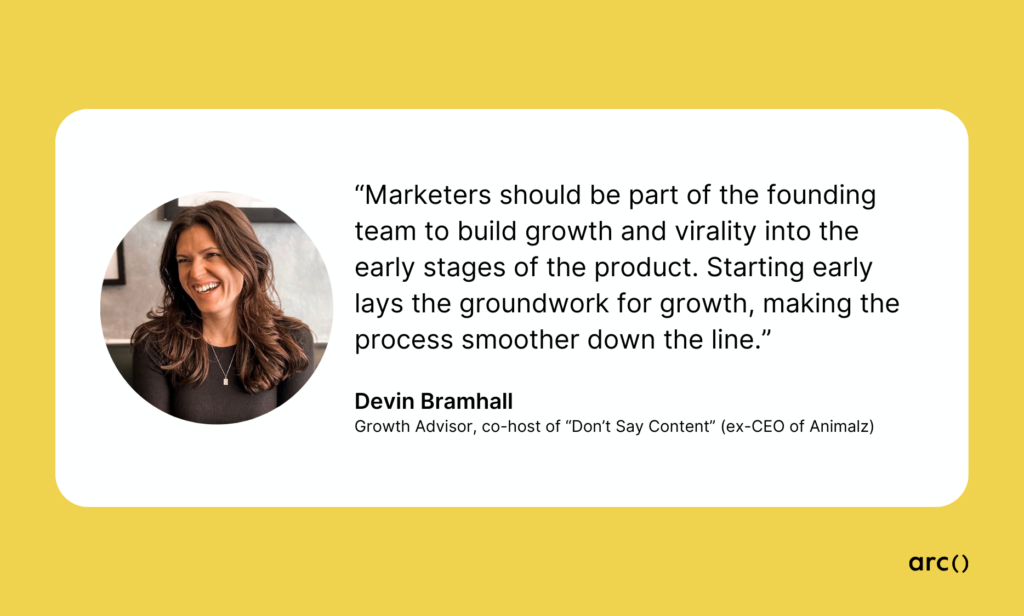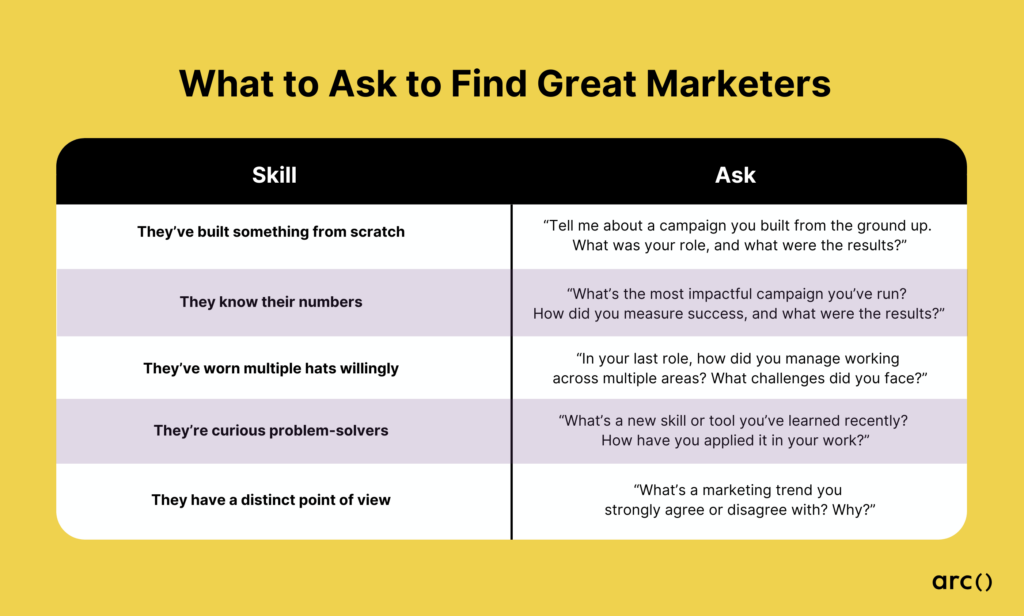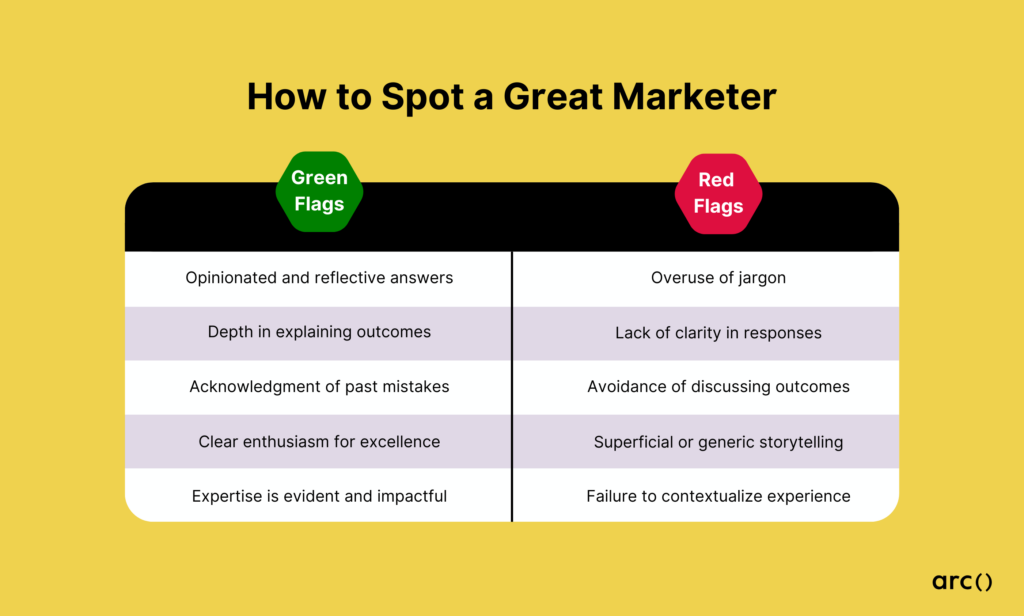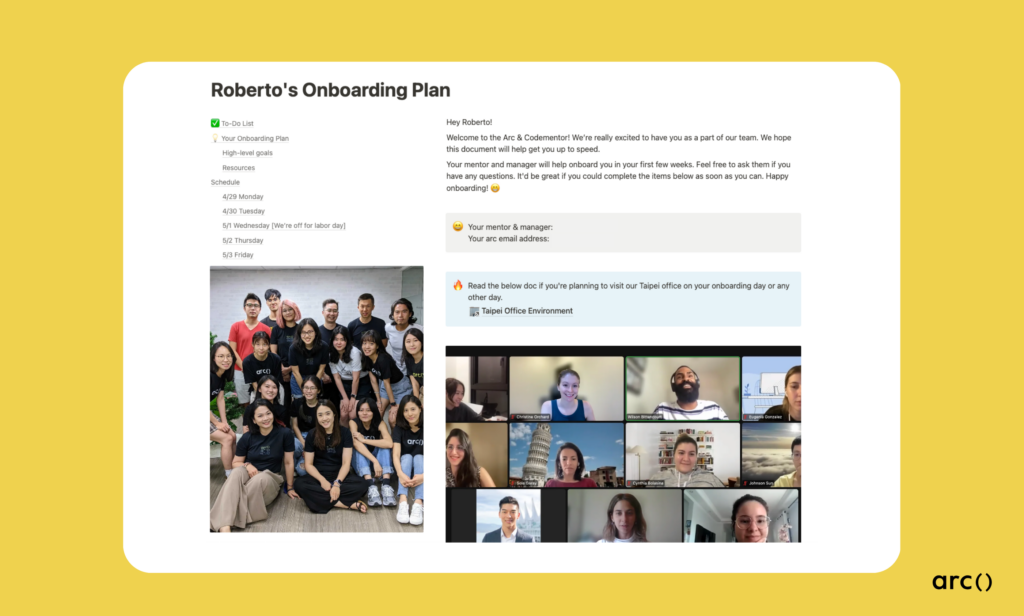So, you’ve decided to hire a marketer. Maybe your “strategy” was winging it on Canva and hoping for the best. Or you hired someone whose ROI turned out to be more “reality check” than “return on investment.”
Does this sound familiar? Relax, you’re not alone. Finding the right marketer for your startup is tough but not impossible. A great hire can significantly alter your trajectory if done right (and at the right time).
Devin Bramhall, a growth advisor to remote startups like Help Scout and tech giants like Cisco, brings over a decade of experience driving growth. As the ex-CEO of Animalz and co-host of the Don’t Say Content podcast, she’s an expert in hiring, managing, and evaluating senior marketers.
Most founders wait until they’re desperate for results to hire a marketer. That’s a huge mistake. It takes time to build trust and community. You should hire one six months before you need to show results—or bring on a freelancer if you’re working with a tight budget. Plan to hire a marketer early and bring them along for the ride.
The good news? By the end of this, you’ll know exactly how to find your dream marketer without losing your sanity or budget. Let’s dig in.
Step 1: Figure Out What You Actually Need
Here’s the deal: not all marketers are built for the same job. Hiring the wrong one for your stage is like asking a barista to fix your car. They have good intentions but the wrong tools.
What’s the fix? Hire early, and hire smart. Devin explains, “Building traction post-product-market fit is so much harder than starting early while you’re still building the product. It boggles my mind that institutional investors still advise startups to wait until product-market fit to hire marketers.”
In other words, waiting until you’re scrambling for results is a losing game. Bring a marketer in early so they can shape your strategy while your product takes form.

Next, figure out what type of marketer fits your stage. Whether you’re pre-launch, scaling, or somewhere in between, the key is to match their skills to your growth needs.
Early Stage: The Swiss Army Knife
You’re pre-PMF and need someone who can (pretty much) do it all. This scrappy problem-solver thrives on tackling ads, emails, and analytics all at once, fueled by caffeine and very comfortable in chaos. The Personal Math newsletter recently called these people “high-output generalists,” and honestly, the term is spot on.
If you want someone to handle everything from strategy to execution, a full-time generalist is great. As Emily Kramer, founder of MKT1, puts it: look for π-shaped marketers—experts in one area (like growth or content) and proficient in another. These “high-output generalists” are ideal for startups.
Freelancers can be your secret weapon if you need expertise in one area or want to test new channels fast. They’re great for experimenting with new strategies—helping you quickly see what works without committing to a full-time hire.

After you make the hire, it can be hard to step back and trust your marketer to do their job. Devin says, “Founders often get caught up in things like the revenue from a single blog post or the color of a CTA button—details that won’t impact real outcomes. Instead of micromanaging, step back. Give your marketer the space to experiment, build, and focus on strategies that actually drive growth.”
Devin recalls a founder who tracked blog posts down to the penny in a spreadsheet, obsessing over ROI at a micro level. This micromanagement distracts from the bigger picture and prevents marketers from focusing on strategies that drive real growth.
The takeaway? Hire someone adaptable, give them clear goals, and let them work their magic. Whether you choose a full-timer or a freelancer, give them at least six months to show results.
Growth Stage: Specialists to Scale
You’ve got traction, and a few channels are showing promise. Now it’s time to level up with specialists—SEO experts, paid media specialists, or content strategists—who can refine what’s working and amplify results. Consider them the personal trainers of marketing: hyper-focused, data-driven, and dedicated to optimizing every move.
To set your marketer up for success, start with a clear, time-based objective—quarterly goals work best. Ask for a strategy that maps out how they’ll achieve those, month by month. Then, you can evaluate progress: Did they hit their target? If not, why not, and how will they course-correct?
Late Stage: Focus on Brand
Your growth is steady and predictable. Now it’s time to focus on storytelling and building emotional connections. At this stage, your marketing hires should be senior, specialized, and focused on growing your brand. Consider them as mixologists of marketing—crafting experiences that captivate and retain customers.
Marketing agencies also shine here. Need to test new channels or scale across platforms quickly? They provide the resources and expertise to get you there. Blaming an agency for poor results is common, but the real issue can be a lack of guidance.
“Agencies are like employees. They need clear direction, collaboration, and feedback to deliver great work. Without someone to guide them, you’re setting everyone up for failure.”
Step 2: Attract the Right Marketer
Once you know who you need, it’s time to attract them. That starts with writing a thoughtful job description. Yet most JDs are so generic they’re forgettable. But the biggest mistake is cramming everything possible into the list of responsibilities.
“Most companies get it wrong by listing every possible marketing function in their job descriptions,” Devin explains. “It’s unrealistic and bad business strategy. Instead, focus on clear outcomes and specific areas of expertise to get the most out of your marketing hire.”
Here’s a better way to recruit marketers:
- Start with why: Lead with your mission in one sentence. Why does your company exist? What impact will they make if they join you?
- Focus on outcomes. Share measurable goals for the role, like “Grow Instagram engagement by 20%,” not a vague list of tasks.
- Be transparent: Include the salary range, growth opportunities, and team dynamics.
Read Devin Bramhall’s full guide and teardown of marketing job descriptions here.
Your job description sets the tone for the types of candidates you’ll attract. A cookie-cutter posting brings in generic applicants. Aim for specific, engaging, and transparent.
The takeaway? Write a job description that is specific, outcome-focused, and transparent. Lead with your mission, highlight measurable goals, and include key details like salary and growth opportunities. Thoughtful job posts attract exceptional marketers.
Read More: Write Job Descriptions that Attract Right-fit Marketers
Step 3: Know Where to Look for Marketers
The best marketing hires aren’t on generic job boards. They share insights, teach others, and showcase results publicly.
Here’s how to meet top marketers where they are:
- Start with founders, operators, and investors in your circle. Personal recommendations are often the quickest way to find marketers who have already proven they can deliver in startups.
- Skip mass job board, the spray-and-pray approach. Try niche sites to connect with vetted, startup-ready marketers who understand your challenges (like Arc for remote talent). Y Combinator’s “Work at a Startup” and the Techstars job boards are also great for finding candidates with the right experience.
- Check out communities. LinkedIn groups, Slack channels (like Demand Curve), or even subreddits where marketers share insights and ideas.
The best talent isn’t always job-hunting. Direct outreach can be your secret weapon. When you find someone doing exactly what you need, send them a thoughtful, personalized message.
The takeaway? Don’t just wait for applications to roll in. Be proactive, build relationships, and focus on finding the right person for your growth stage.
Arc connects you with qualified marketers you’ll actually want to interview.
⚡️ Meet top vetted marketers in 72 hours
⚡️ Access a global talent pool of 450,000
⚡️ Hire freelance or full-time remote roles
Hire top marketing experts now →
Step 4: Identify the Right Marketer
The real test of a marketer is how they think, solve problems, and deliver measurable results. Asking smart questions and using hands-on projects will help you uncover who is truly ready to make an impact.
“Great marketers are easy to spot—they have strong, opinionated responses,” says Devin. “They’ll critique their past work, reflect on their decisions, and share lessons learned. You don’t have to dig—they’ll make their expertise obvious.”
5 Signals to Look For
- They’ve Built Something From Scratch
Seek creators, not maintainers. The ideal candidate has launched channels, grown audiences, or built campaigns from the ground up. They should be able to demonstrate initiative and a track record of making things happen. - They Know Their Numbers
Great marketers can confidently share metrics that highlight their impact—like reducing CAC, boosting LTV, or increasing email open rates. Look for someone who is as comfortable with data as they are with creativity. - They’ve Worn Multiple Hats Willingly
Startups require flexibility. The right marketer has experience juggling different areas—like SEO, paid media, content, and analytics—without losing focus. - They’re Curious Problem-Solvers
Self-starters thrive in startups. Look for candidates who actively learn new skills, experiment with tools, and tackle challenges without waiting for guidance. - They Have a Distinct Point of View
Wes Kao calls this a “spiky” point of view—a bold, experience-driven perspective that sets a marketer apart. Strong candidates will have opinions rooted in their experiences and aren’t afraid to challenge conventional wisdom.

Intentional Interview Questions
One of Devin’s favorite interview questions uncovers a candidate’s self-awareness and ability to receive feedback:
What’s a piece of criticism you’ve received across companies, clients, or coworkers? How did you respond, and what did you learn?
“It’s actually more important to interview for culture fit, resilience, and motivation than just technical skills,” says Devin. “You can teach skills, but you can’t teach passion or adaptability.”
Pro Tip: For added depth, incorporate the former VP of Marketing at Buffer, Kevan Lee’s interview questions for marketers, designed to uncover strategic thinking.
Test Their Skills
A practical test project is key. Actual examples of their work reveal how a candidate thinks and delivers under realistic conditions. Here are a few ideas:
- Ask them to evaluate one of your landing pages and suggest improvements with the expected impact.
- Draft a strategy for a specific goal, such as a social media plan.
- Use a blog-writing test like the one from the Grow and Convert content marketing agency shared to assess writing skills and strategic thinking.
Devin reminds us, “Don’t ask for online writing samples because those have been edited, so you can’t tell how good they are. They should do a project or live collaboration first” for content marketing roles.
Summing It Up
Watch out for these green and red flags during the interview process:

The takeaway? Devin says, “When candidates go into the details and nuance of a campaign they ran—or a goal they did or didn’t achieve—they demonstrate their knowledge, talent, and experience. Be specific and avoid leaning on industry jargon. I expect them to call out the context and position their experience effectively.”
Step 5: Set Your Marketer Up For Success
Hiring is only half the battle. You also need a strong onboarding process to set your marketer up for success. According to BambooHR, 70% of new hires decide if a job feels right within the first month—and 29% decide in just a week. Strong onboarding within the first two months is key to retaining them long-term.
Here’s How to Onboard New Hires:
- Share context. Provide key materials like your marketing strategy, past campaigns, and performance data. Include a “who’s who” guide for navigating the team.
- Set Clear Goals. Outline priorities for the first 2 weeks, 1 month, and 90 days. Be specific about what success looks like.
- Intro Key People. Schedule meetings with stakeholders and team members they’ll work closely with. This builds relationships and ensures alignment from the start.
- Assign a Mentor. Pair them with a buddy—either a peer or an experienced team member—who can answer questions, offer guidance, and support their onboarding.
- Focus on Early Wins. Start with a small, high-impact project to build confidence and momentum—like launching a quick email campaign or optimizing an underperforming ad.

Pro Tip: Onboarding should be intentional. A little effort upfront ensures your marketer feels supported and clear on expectations (critical when working remotely). Check out our full guide on how to onboard remote hires here.
When Things Don’t Work Out
Devin admits, “The biggest hiring mistake I made? Not firing fast enough. One hire who wasn’t a cultural fit disrupted the team for months. Once they were gone, the team quickly aligned and morale improved.”
The takeaway? Set new hires up for success with clear goals, early wins, and a mentor for support. Be decisive to save time and resources if it’s not working.
Final Thoughts
The right marketer at the right time brings creativity, grit, and results. Take the time to find them, support their success, and adjust as needed. Start small, stay focused, and keep long-term growth in sight. You’ve got this.
Need the perfect marketer? Arc can connect you with vetted, startup-savvy talent in days. Start your search today for freelance or full-time remote talent.
Special Offer: Get $1,000 credit for your first hire! Ends 12/31.








